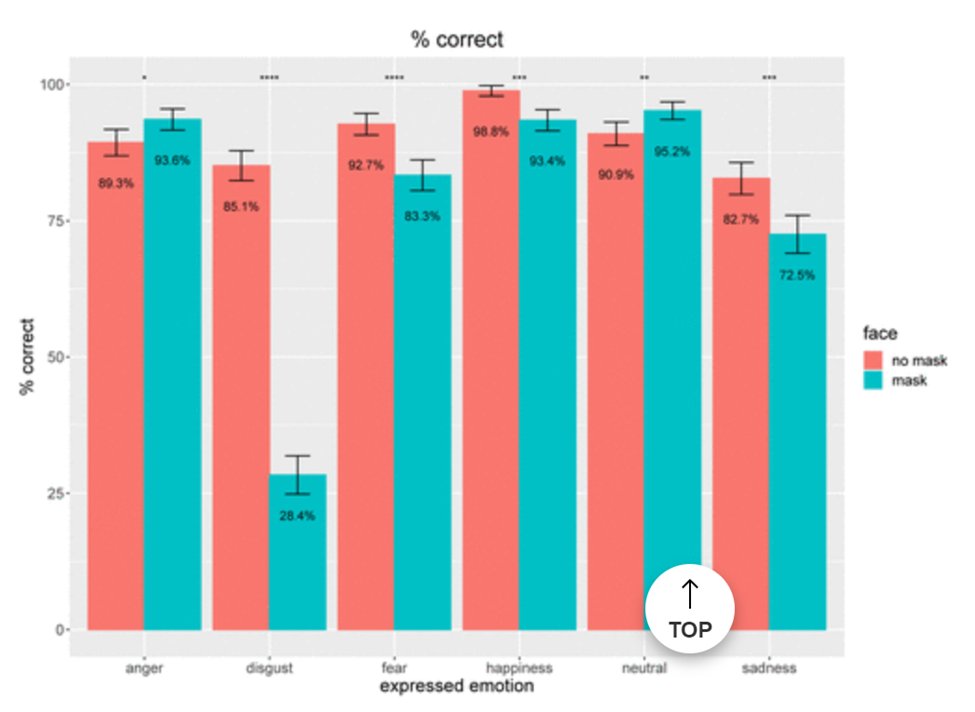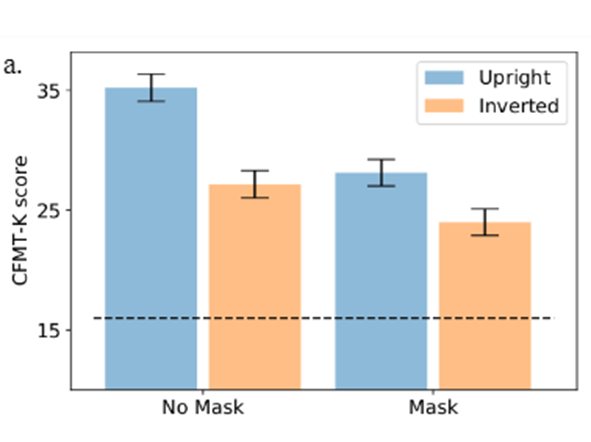
The myth of "mask harms" rests on assuming kids need to see entire faces to accurately recognize emotions. In fact, accuracy is sometimes better with masks. In her Substack, @ProfEmilyOster, guru of cost-benefit analysis, ignores mask's benefits & overstates its costs. 🧵 

She then considers whether masks impede the reading of facial expression of whether “seeing half a face is almost as good as a whole face.” 

Though artful in wording what she takes the studies to show, the reader would be forgiven for thinking Oster’s claim is that the studies show that half a face isn’t as good as a whole. 

But that’s not what the studies show. Mostly, they show masking has no substantial cost to emotion recognition. They also show an occasional benefit; something you’d think an economist who rests her credibility on cost-benefit analyses wouldn’t overlook.
But I digress.
But I digress.
One of the studies Oster considers is a Florida study of 57 elementary school kids aged 9-10 who are shown stock photos with and without digitally placed surgical masks. journals.sagepub.com/doi/full/10.11… 

Overall performance dropped, but not substantially: from 89.9% to 77.7%. But notably, there are increases in recognition for both anger and a neutral face when masked. 

A second study Oster considers seems ill-suited to support any claim that masks harm recognition. The authors summarize their findings: “These results highlight how children’s social interactions may be minimally impacted by mask wearing during the COVID-19 pandemic.” 

The third article, which also studied recognition upright and inverted, finds a more significant impact of masks. 

Having read some recognition studies, one of the things I look for is how widespread mask use was where the study took place. What I have found is unsurprising: in places with widespread mask use, over time, particularly where masks are mandated, emotion recognition improves.
And so it is that Oster chooses a study, from Canada, where masks were rarely mandated in schools; though sometimes for 5th graders (the study subjects were ages 6-14) and sometimes on buses. ohscanada.com/features/guide…
In this study, from Italy, which is not part of Oster’s “research”, 50 kids aged 6-7 were shown photos of anger, happiness, fear, surprise, sadness, disgust & neutral. The photos were shown three different ways: whole face, eyes only or mouth only.
ncbi.nlm.nih.gov/labs/pmc/artic…
ncbi.nlm.nih.gov/labs/pmc/artic…
Like Oster’s first study, this study finds the whole face sometimes makes emotional recognition worse. For neutral expressions, mouth only is favored. For sadness, recognition is best when the face is obscured save for the eyes (which is the effect of masks). 

The importance of the eyes to emotional recognition, raises an interesting problem for anti-maskers: Why aren’t you objecting to sunglasses too?
which is an interesting way of pointing out: talk of mask harms trades on intuitions that are prima facie plausible but rest on questionable evidence.
So much for Oster and her cold, hard “data”.
So much for Oster and her cold, hard “data”.
The authors theorize that, when the whole face impedes recognition, it is because confounding cues are left exposed. 

As it turns out, and as other research shows, one of the biggest confounders in emotional recognition is the mouth; in particular smiles.
Though not about masks per se, this study shows that smiles, given their saliency, introduce a bias towards happiness.
link.springer.com/article/10.100…
link.springer.com/article/10.100…

According to this study, favoring the eyes over the mouth is more accurate in distinguishing fake smiles from genuine smiles.
ncbi.nlm.nih.gov/labs/pmc/artic…
ncbi.nlm.nih.gov/labs/pmc/artic…

So there are some overlooked benefits and very little lost. This leaves us a long way from justifying exposure to a pathogen for which thousands have been hospitalized, hundreds died, has long term implications & has resulted in over 140K losing a parent.
abcnews.go.com/GMA/News/kids-…
abcnews.go.com/GMA/News/kids-…
It’s worth also noting that many studies show kids’ recognition of emotions is unaffected or that, by compensating, is just as good with masks as without. Compensation is important. The studies are done by showing kids photographs.
But what Oster and company are concerned about is schools. There kids are taught by entire bodies which appear in person, not only on paper. A veritable cornucopia of emotional cues including those conveyed by the voice! Or am I harping on details?
So for example, this study shows masks make no difference if the whole body is visible. psyarxiv.com/c5x97
Similarly, this article shows that kids compensate for masks by using “contextual clues”.
journals.plos.org/plosone/articl…
journals.plos.org/plosone/articl…
This study presents evidence young kids are not at all impaired by faces wearing masks. sciencedirect.com/science/articl…
Masks make very little difference according to this study.
researchgate.net/publication/35…
researchgate.net/publication/35…
• • •
Missing some Tweet in this thread? You can try to
force a refresh












